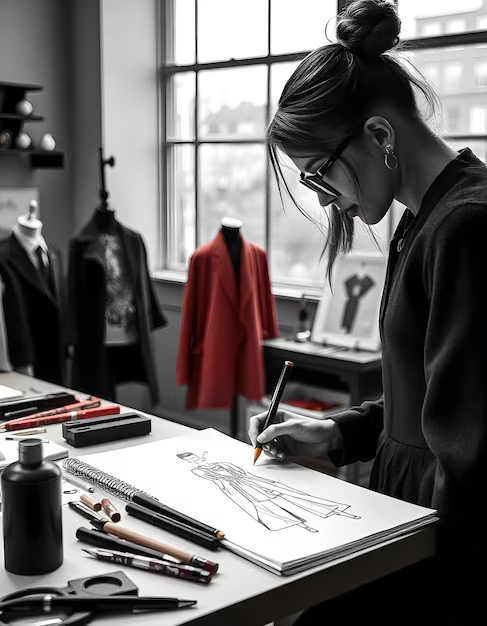
Fashion design is a fascinating blend of artistry, technical skill, and market understanding. From the initial concept to the final garment, here’s a look at how fashion designers create clothing that resonates with consumers.
1. Inspiration and Research
- Designers start by researching trends, themes, and materials.
- They often gather inspiration from art, history, nature, or cultural elements.
2. Concept Development
- Explain how designers translate inspiration into a concept or theme.
- Mention the role of mood boards and color palettes.
3. Sketching Designs
- Talk about the significance of sketching in the design process.
- Include tips for aspiring designers on how to improve their sketching skills.
4. Choosing Fabrics
- Explain the importance of fabric selection in fashion design.
- Discuss different types of fabrics and their characteristics.
5. Pattern Making
- Describe the process of creating patterns and its importance.
- Explain how patterns dictate the fit and structure of garments.
6. Creating Samples
- Outline the sample-making process and its role in design refinement.
- Include anecdotes or quotes from designers about their sample-making experiences.
7. Fitting and Adjustments
- Discuss the fitting process and how adjustments are made.
- Explain the importance of fit in fashion and its impact on the final product.
8. Production Process
- Briefly outline the steps involved in moving from design to production.
- Discuss collaborations with manufacturers and the importance of quality control.
9. Marketing and Presentation
- Explain how designers showcase their collections (fashion shows, look books, etc.).
- Discuss the role of social media in modern fashion marketing.
10. Feedback and Future Design
- Talk about how designers gather feedback from consumers and retailers.
- Discuss how this feedback influences future collections.
Additional Tips
- Use visuals: Include sketches, fabric samples, and photos from fashion shows to make the blog more engaging.
- Feature interviews: Consider interviewing local designers or students in fashion programs for unique perspectives.
- Stay updated: Keep up with current fashion trends and events to provide timely and relevant content.
________________________________________________________________________________________________________________
Conclusion
- Recap the design process and its significance in the fashion industry.
- Encourage readers to explore their own creative potential in fashion design.
________________________________________________________________________________________________________________
Call to Action
- Invite readers to share their thoughts or experiences in fashion design.
- Suggest following your blog for more insights into the fashion world
________________________________________________________________________________________________________________
